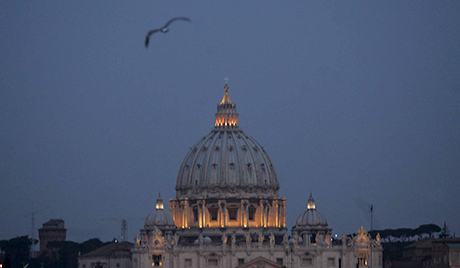The Holy See to Fight Graft
Voice of Russia
An ad-hock investigation commission is due to report to Pope Francis I later this month on its probe into financial irregularities at the Vatican Bank. The Pontiff decided to put an end to fraud at the Institute for the Works of Religion, which is the official name of the Roman Curia's financial centre, right on his election in spring this year. The decision was prompted by advice from Italy's Finance Guard, which has been conducting its own probe into the Vatican Bank fraud since early this year. The investigation caused "voluntary resignations" in summer of the Vatican Bank Director Paolo Cipriani, Deputy Director Massimo Tulli, as well as about a dozen of lower-rank officials. The Vicar of Christ said during his Sunday Mass that it would be good to "tie corrupt officials to a rock and throw them in the sea", which is a quote from St. Luke the Evangelist. It is the first time that the Pontiff has made such a peremptory statement, which is evidence of his irritation at the fact that corruption and profit have taken root in the Catholic Church, and is also an admission that graft has reached epidemic proportions that call for interventions and drastic moves by secular and clerical authorities. Alas, it is human to be greedy, and man gives in to temptation, that is why Pope Francis called attention to that deadly sin, the general director of the Russian Political Information Centre, Alexei Mukhin, has told the Voice of Russia. Experience has shown that neither the super-hard measures, like shooting bribe-takers in China, nor attempted persuasion have proved helpful in extirpating that ugly phenomenon, he added. "As to Russia, we will never root out graft in its present flourishing form until we start confiscating the bribe-takers' properties on a large scale. Subject to property seizures should be all properties, not just those gained by crooked means, and also the properties of family members of the criminals. I think this will help to largely and quickly reduce corruption". Officials have no fear of fines. They are prepared to pay fines for multi-million dollar (or rouble) bribes, and even serve a one- or two-year term in jail, and then start enjoying life again. In short, seizing their properties is the only way to get started effectively, Alexei Mukhin says. The view is shared by another Russian expert, Chairman of the Moscow Anti-Corruption Committee Mansour Yusupov. But he specified in a Voice of Russia interview that properties should not be seized in keeping with the principle "plunder the swag". Everything should first be substantiated in a courtroom, Yusupov said. "Once Russian MPs finally adopt a law on anti-corruption sanctions and seizing properties, one can speak of the effectiveness of the measures taken. We do have relevant laws, but these are not abided by in full. Liberalizing laws against economic crimes and graft proved fruitless, as President Vladimir Putin has recognized recently". Just how deeply the world has sunk in graft is due to become known early next month, when Transparency International makes public another of its Corruption Perception Index. The authors admit that the report is not an absolutely accurate indicator of world corruption, and is based on the polls of analysts, businessmen etc. concerning the type of graft that they and their companies normally come across. The most graphic example of inaccuracies is Iceland, which has been on the list of the top ten least corrupt countries for years on end. It retained its 'least corrupt nation' status following its banking system collapse due to the 2008 global financial crisis, although it had been proved that the national government and several influential families of the island nation were heavily paid in kickbacks by the banks, or influenced their decisions. Transparency International's report helps us get some idea of who and where likes to have their palms greased the most. In 2012, Transparency's list of the first five "most transparent" nations featured Denmark, Finland, New Zealand, Sweden and Singapore. Of the 176 countries under review Russia was placed 133rd, improving its standing by almost 10 points. Somalia is the last on the list, and small wonder, since there is actually no central government or statehood as such in Somalia. China is the 80th on the list. Incidentally, claims that over 10,000 have been executed by shooting in China for corruption in the last 10 years fail to meet reality. The figure 10,000 comprises all sorts of criminals, including traitors. The number of bribe-takers executed by shooting in China in the last decade is slightly over 1,000. But then, this is no small figure, either. []
|
.
Any original material on these pages is copyright © BishopAccountability.org 2004. Reproduce freely with attribution.
